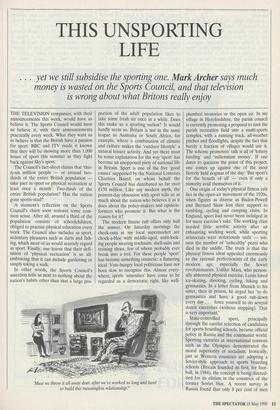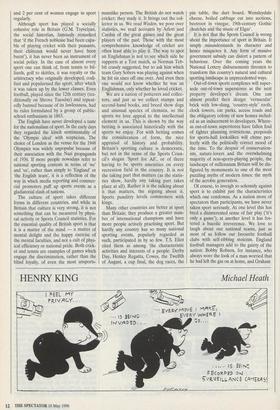THIS UNSPORTING LIFE
. . . yet we still subsidise the sporting one. Mark Archer says much
money is wasted on the Sports Council, and that television is wrong about what Britons really enjoy
THE TELEVISION companies, with their announcements this week, would have us believe it. The Sports Council would have us believe it, with their announcements practically every week. What they want us to believe is that the British have a passion for sport. BBC and ITV made it known that they will be showing more than 1,000 hours of sport this summer as they fight back against Sky's sport.
The Council's fact-sheet claims that 'thir- ty-six million people — or around two- thirds of the entire British population take part in sport or physical recreation at least once a month'. Two-thirds of the entire British population? Has the nation gone sports-mad?
A moment's reflection on the Sports Council's claim soon restores some com- mon sense. After all, around a third of the population consists of schoolchildren, obliged to practise physical education every week. The Council also includes as sport, sedentary pleasures such as darts and fish- ing, which most of us would scarcely regard as sport. Finally, one learns that their defi- nition of 'physical recreation' is so all- embracing that it can include gardening or simply taking a walk.
In other words, the Sports Council's assertion tells us next to nothing about the nation's habits other than that a large pro- portion of the adult population likes to take some fresh air once in a while. Does this make us a sporting nation? It would hardly seem so. Britain is not in the same league as Australia or South Africa, for example, where a combination of climate and culture makes the 'outdoor lifestyle' a natural leisure activity. And yet there must be some explanation for the way 'sport' has become an unopposed piety of national life in Britain. Sport is one of the five 'good causes' supported by the National Lotteries Charities Board, on whose behalf the Sports Council has distributed so far over £150 million. Like any modern myth, the present-day obsession with sport tells us as much about the nation who believes it as it does about the policy-makers and opinion- formers who promote it. But what is the reason for it?
The modern fitness cult offers only half the answer. On Saturday mornings the check-outs at my local supermarket are chock-a-bloc with middle-aged, unfit-look- ing people wearing tracksuits, shell-suits and training shoes, few of whom probably ever break into a trot. For these people 'sport' has become something cosmetic: a flattering ideal. Vote-hungry local politicians have not been slow to recognise this. Almost every- where, sports 'amenities' have come to be regarded as a democratic right, like well- `Must we throw it all away dear, after we've worked so long and hard to build this meaningless relationship?' plumbed lavatories or the open air. In my village in Herefordshire, the parish council is currently promoting a proposal to turn the parish recreation field into a multi-sports complex, with a running track, all-weather pitches and floodlights, despite the fact that barely a fraction of villages would use it. The scheme promoters' talk is all of 'lottery funding' and 'millennium money'. If one dares to question the point of this project, one comes up against one of the most fiercely held dogmas of the day: 'But sport's for the benefit of all' — even if only a minority avail themselves of it.
One origin of today's physical fitness cult lies in the open-air movement of the 1920s, when figures as diverse as Baden-Powell and Bernard Shaw lent their support to rambling, cycling and camping clubs. In England, sport had never been indulged in for mere exercise's sake. The working class needed little aerobic activity after an exhausting working week, while sporting aristocrats were notoriously unfit — wit- ness the number of 'unhealthy' peers who died in the saddle. The truth is that the physical fitness ideal appealed enormously to the rational perfectionists of the early modern age, especially the Soviet revolutionaries. Unlike Marx, who person- ally abhorred physical exercise, Lenin loved ice-skating, shooting, cycling, hiking and gymnastics. In a letter from Munich to his sister, then in prison, he urged her 'to do gymnastics and have a good rub-down every day . . . force yourself to do several dozen excercises (without stopping). That is very important.'
State-controlled sport, principally through the careful selection of candidates for sports boarding schools, became official policy in Russia and the communist world. Sporting victories at international contests such as the Olympics demonstrated the moral superiority of socialism. Ironically, just as Western countries are adopting a Soviet-style approach to sports boarding schools (Britain founded its first, for foot- ball, in 1984), the concept is being discred- ited for its elitism in the countries of the former Soviet bloc. A recent survey in Russia found that only 8 per cent of men and 2 per cent of women engage in sport regularly.
Although sport has played a socially cohesive role in Britain (G.M. Trevelyan, the social historian, famously remarked that 'if the French noblesse had been capa- ble of playing cricket with their peasants, their châteaux would never have been burnt'), it has never been an instrument of social policy. In the case of almost every sport one can think of, from tennis to bil- liards, golf to skittles, it was royalty or the aristocracy who originally developed, codi- fied and popularised the sport, after which it was taken up by the lower classes. Even football, played since the 12th century (tra- ditionally on Shrove Tuesday) and repeat- edly banned because of its lawlessness, had its rules formulated by a group of public- school enthusiasts in 1863.
The English have never developed a taste for the nationalism of sport. In the early days they regarded the kitsch sentimentality of the 'Olympic ideal' with scepticism. The choice of London as the venue for the 1948 Olympics was widely unpopular because of their association with the Nazi propaganda of 1936. If more people nowadays refer to national sporting contests in terms of 'we' and 'us', rather than simply to 'England' or `the English team', it is a reflection of the way in which media reporting and commer- cial promoters puff up sports events as a gladiatorial clash of nations.
The culture of sport takes different forms in different countries, and while in Britain that culture is very strong, it is not something that can be measured by physi- cal activity or Sports Council statistics. For the essential quality of British sport is that it is a matter of the mind — a matter of mental delight and the happy exercise of the mental faculties, and not a cult of phys- ical efficiency or national pride. Both crick- et and tennis are examples of games which engage the discrimination, rather than the blind loyalty, of even the most unsports- manslike person. The British do not watch cricket; they study it. It brings out the col- lector in us. We read Wisden, we pore over statistics, we read accounts by Arlott and Cardus of the great games and the great players of the past. Those with the most comprehensive knowledge of cricket are often least able to play it. The way to spot an Englishman is not to see which side he supports at a Test match, as Norman Teb- bit crassly suggested, but to ask him which team Gary Sobers was playing against when he hit six sixes off one over. And even then one would not know whether he was an Englishman, only whether he loved cricket.
We are a nation of potterers and collec- tors, and just as we collect stamps and second-hand books, and breed show dogs and unusual species of clematis, so the sports we love appeal to the intellectual element in us. This is shown by the way betting is associated historically with the sports we enjoy. For with betting comes the consideration of form, the nice appraisal of history and probability. Britain's sporting culture is democratic, but not in the sense of the Sports Coun- cil's slogan 'Sport for All', or of there having to be sports amenities on every recreation field in the country. It is not the taking part that matters (as the statis- tics show, hardly any taking part takes place at all). Rather it is the talking about it that matters, the arguing about it. Sports punditry levels commoners with kings.
Many other countries are better at sport than Britain; they produce a greater num- ber of international champions and have more people actively practising sport. But hardly any country has so many national sporting events, popularly regarded as such, participated in by so few. T.S. Eliot cited them as among 'the characteristic activities and interests of a people: Derby Day, Henley Regatta, Cowes, the Twelfth of August, a cup final, the dog races, the pin table, the dart board, Wensleydale cheese, boiled cabbage cut into sections, beetroot in vinegar, 19th-century Gothic churches and the music of Elgar'.
It is not that the Sports Council is wrong about the importance of sport in Britain. It simply misunderstands its character and hence misquotes it. Any form of massive government subsidy can distort a pattern of behaviour. Over the coming years the National Lottery disbursements threaten to transform this country's natural and cultural sporting landscape in unprecedented ways.
Out-of-town sports complexes will super- sede out-of-town superstores as the next property developer's dream. One can almost predict their design: 'vernacular' brick with low-slung, 'country-style' roofs, clock towers, car parks, access roads and the obligatory colony of new homes includ- ed as an inducement to developers. Where- as out-of-town superstores have fallen foul of tighter planning restrictions, proposals for sports-hall lookalikes will chime per- fectly with the politically correct mood of the time. To the despair of conservation- ists, nature-lovers and the overwhelming majority of non-sports-playing people, the landscape of millennium Britain will be dis- figured by monuments to one of the most puzzling myths of modern times: the myth of the aerobic generation.
Of course, to inveigh so solemnly against sport is to exhibit just the characteristics which one condemns. As a nation more of spectators than participants, we have never taken sport seriously. At one level this has bred a disinterested sense of fair play (It's only a game'); at another level it has fos- tered a bucolic irreverence. We love to laugh about our national teams, just as most of us follow our favourite football clubs with self-ribbing stoicism. England football managers add to the gaiety of the nation: Bobby Robson, for instance, who always wore the look of a man worried that he had left the gas on at home, and Graham Taylor, 'Turnip Head' to millions of Sun readers. But if the Government's sports ini- tiative succeeds, perhaps we will become a nation of solemn sports consumers. Will Carling and the Princess of Wales will lend their support to Sports Therapy Centres and Schools for Physical Excellence. We will have become more single-minded and more fit, and a lot less fun.




































































 Previous page
Previous page